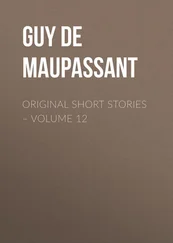He had never taken life easy, as he had never had anything but his monthly salary. His life had been uneventful, without emotions, without hopes. The faculty of dreaming with which every one is blessed had never developed in the mediocrity of his ambitions.
When he was twenty–one he entered the employ of Messieurs Labuze and Company. And he had never left them.
In 1856 he had lost his father and then his mother in 1859. Since then the only incident in his life was when he moved, in 1868, because his landlord had tried to raise his rent.
Every day his alarm clock, with a frightful noise of rattling chains, made him spring out of bed at 6 o'clock precisely.
Twice, however, this piece of mechanism had been out of order—once in 1866 and again in 1874; he had never been able to find out the reason why. He would dress, make his bed, sweep his room, dust his chair and the top of his bureau. All this took him an hour and a half.
Then he would go out, buy a roll at the Lahure Bakery, in which he had seen eleven different owners without the name ever changing, and he would eat this roll on the way to the office.
His entire existence had been spent in the narrow, dark office, which was still decorated with the same wall paper. He had entered there as a young man, as assistant to Monsieur Brument, and with the desire to replace him.
He had taken his place and wished for nothing more.
The whole harvest of memories which other men reap in their span of years, the unexpected events, sweet or tragic loves, adventurous journeys, all the occurrences of a free existence, all these things had remained unknown to him.
Days, weeks, months, seasons, years, all were alike to him. He got up every day at the same hour, started out, arrived at the office, ate luncheon, went away, had dinner and went to bed without ever interrupting the regular monotony of similar actions, deeds and thoughts.
Formerly he used to look at his blond mustache and wavy hair in the little round mirror left by his predecessor. Now, every evening before leaving, he would look at his white mustache and bald head in the same mirror. Forty years had rolled by, long and rapid, dreary as a day of sadness and as similar as the hours of a sleepless night. Forty years of which nothing remained, not even a memory, not even a misfortune, since the death of his parents. Nothing.
That day Monsieur Leras stood by the door, dazzled at the brilliancy of the setting sun; and instead of returning home he decided to take a little stroll before dinner, a thing which happened to him four or five times a year.
He reached the boulevards, where people were streaming along under the green trees. It was a spring evening, one of those first warm and pleasant evenings which fill the heart with the joy of life.
Monsieur Leras went along with his mincing old man's step; he was going along with joy in his heart, at peace with the world. He reached the Champs–Elysees, and he continued to walk, enlivened by the sight of the young people trotting along.
The whole sky was aflame; the Arc de Triomphe stood out against the brilliant background of the horizon, like a giant surrounded by fire. As he approached the immense monument, the old bookkeeper noticed that he was hungry, and he went into a wine dealer's for dinner.
The meal was served in front of the store, on the sidewalk. It consisted of some mutton, salad and asparagus. It was the best dinner that Monsieur Leras had had in a long time. He washed down his cheese with a small bottle of burgundy, had his after–dinner cup of coffee, a thing which he rarely took, and finally a little pony of brandy.
When he had paid he felt quite youthful, even a little moved. And he said to himself: "What a fine evening! I will continue my stroll as far as the entrance to the Bois de Boulogne. It will do me good." He set out. An old tune which one of his neighbors used to sing kept returning to his mind. He kept on humming it over and over again. A hot, still night had fallen over Paris. Monsieur Leras walked along the Avenue du Bois de Boulogne and watched the cabs drive by. They kept coming with their shining lights, one behind the other, giving horn a glimpse of the couples inside, the women in their light dresses and the men dressed in black.
It was one long procession of lovers, riding under the warm, starlit sky. They kept on coming in rapid succession. They passed by in the carriages, silent, side by side, lost in their dreams, in the emotion of desire, in the anticipation of the approaching embrace. The warm shadows seemed to be full of floating kisses. A sensation of tenderness filled the air. All these carriages full of tender couples, all these people intoxicated with the same idea, with the same thought, seemed to give out a disturbing, subtle emanation.
At last Monsieur Leras grew a little tired of walking, and he sat down on a bench to watch these carriages pass by with their burdens of love. Almost immediately a woman walked up to him and sat down beside him. "Good–evening, papa," she said.
He answered: "Madame, you are mistaken."
She slipped her arm through his, saying: "Come along, now; don't be foolish. Listen―"
He arose and walked away, with sadness in his heart. A few yards away another woman walked up to him and asked: "Won't you sit down beside me?" He said: "What makes you take up this life?"
She stood before him and in an altered, hoarse, angry voice exclaimed:
"Well, it isn't for the fun of it, anyhow!"
He insisted in a gentle voice: "Then what makes you?"
She grumbled: "I've got to live! Foolish question!" And she walked away, humming.
Monsieur Leras stood there bewildered. Other women were passing near him, speaking to him and calling to him. He felt as though he were enveloped in darkness by something disagreeable.
He sat down again on a bench. The carriages were still rolling by. He thought: "I should have done better not to come here; I feel all upset." He began to think of all this venal or passionate love, of all these kisses, sold or given, which were passing by it front of him. Love! He scarcely knew it. In his lifetime he had only known two or three women, his means forcing him to live a quiet life, and he looked back at the life which he had led, so different from everybody else, so dreary, so mournful, so empty.
Some people are really unfortunate. And suddenly, as though a veil had been torn from his eyes, he perceived the infinite misery, the monotony of his existence: the past, present and future misery; his last day similar to his first one, with nothing before him, behind him or about him, nothing in his heart or any place.
The stream of carriages was still going by. In the rapid passage of the open carriage he still saw the two silent, loving creatures. It seemed to him that the whole of humanity was flowing on before him, intoxicated with joy, pleasure and happiness. He alone was looking on. To–morrow he would again be alone, always alone, more so than any one else. He stood up, took a few steps, and suddenly he felt as tired as though he had taken a long journey on foot, and he sat down on the next bench.
What was he waiting for? What was he hoping for? Nothing. He was thinking of how pleasant it must be in old age to return home and find the little children. It is pleasant to grow old when one is surrounded by those beings who owe their life to you, who love you, who caress you, who tell you charming and foolish little things which warm your heart and console you for everything.
And, thinking of his empty room, clean and sad, where no one but himself ever entered, a feeling of distress filled his soul; and the place seemed to him more mournful even than his little office. Nobody ever came there; no one ever spoke in it. It was dead, silent, without the echo of a human voice. It seems as though walls retain something of the people who live within them, something of their manner, face and voice. The very houses inhabited by happy families are gayer than the dwellings of the unhappy. His room was as barren of memories as his life. And the thought of returning to this place, all alone, of getting into his bed, of again repeating all the duties and actions of every evening, this thought terrified him. As though to escape farther from this sinister home, and from the time when he would have to return to it, he arose and walked along a path to a wooded corner, where he sat down on the grass.
Читать дальше












